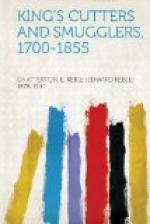So the Swan sailed away from Swanage Bay to the eastward and at midnight made the Needles. It now fell calm, but the luggers hove in sight and approached by means of their sweeps. As they came on, the cutter, instead of preparing to receive them in the only way they deserved, did nothing. But one of the Swan’s crew, whose name, Edward Bartlett, deserves to be remembered for doing his duty, asked Comben if he should fetch the grape and canister from below. Comben merely replied: “There is more in the cabin than we shall want: it will be of no use; it is all over with us.” Such was the attitude of one who had signed into a service for the prevention of smuggling craft. Instead of taking any definite action he waited despairingly for the enemy to come on. He then issued no orders to his crew to prepare to engage; he just did nothing and remained inactive under the white cliffs. But if their commander was a coward, at any rate his crew were determined to make a contest of it. They had actually to urge him to fight, but the luggers were right close on to the cutter before Comben had given the word. After that for three-quarters of an hour the crew fought the ship, and were at their respective quarters when Comben actually turned to the luggers and shouted to them: “Leave off firing; I have struck.” During the engagement he had shown great signs of fear and never encouraged his crew to fight.
Seeing that they were led by a coward, the Swan’s crew also took fright and thought it best to flee. They therefore jumped into the cutter’s boats and rowed ashore, leaving their valiant commander to look after the Swan as best he might. She was of course immediately captured by the luggers, and as for Comben, he was taken prisoner, carried to France, detained there, and did not return to England till after seven years, when an investigation was made into his conduct by the Surveyors-General of the Customs, his defence being that “his men had deserted him.” As for the latter, they reached the shore safely and were again employed in the Preventive Service.




